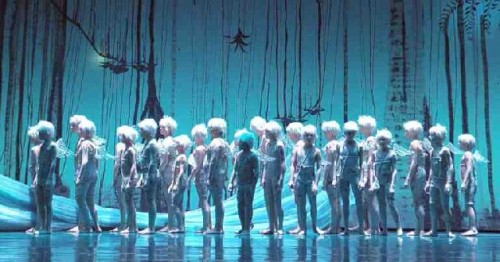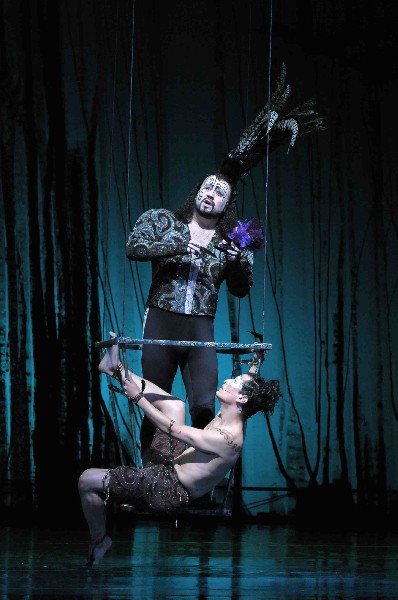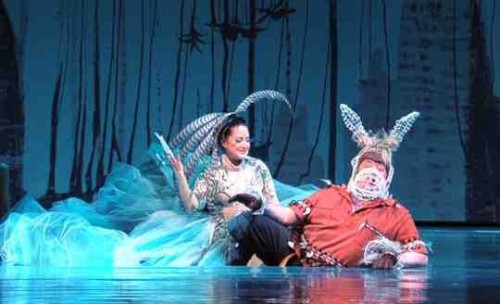Britten Enchants at Lyric Opera of Chicago
Midsummer Night's Dream Wafts By
By: Susan Hall - Nov 24, 2010
Midsummer Night’s Dream
By Benjamin Britten
Libretto, Peter Pears
Conducted by Rory Macdonald
November 23, 2010
Cast
Puck Esteban Andres Cruz
Oberon David Daniels
Tytania Anna Christy
Lysander Shawn Mathey
Hermia Elizabeth Deshonng
Demetrius Lucas Meachem
Helena Erin Wall
Bottom Peter Rose
Flute Keith Jameson
Anima, Young Singers of Greater Chicago
Emily Ellsworth, Director
Set and Costume Designer Dale Ferguson
Stage Director Neil Armfield
Lyric Opera of Chicago
Photo credits Dan Rest/Lyric Opera of Chicago
Some enchanted evening was mounted at the Lyric Opera of Chicago in a new production of Benjamin Britten’s Midsummer Night’s Dream. How could the diarist Samuel Pepys have written “the most insipid ridiculous play that I ever saw in my life.” Pepys did admit, “I saw, I confess, some good dancing and some handsome women, which was all my pleasure…” Ever since then, the play has been identified with sensual pleasure and on that score, and almost any other you can imagine, this production does not disappoint.
Britten had taken off time from other work to compose a new opera for the reopening of the Aldeburgh Festival which he had founded with this opera’s librettist, tenor Peter Pears. The Festival Hall has been extensively renovated and expanded and a new work was announced for its re-opening. Britten had to produce in a short time frame and looked to Shakespeare and Midsummer Night’s Dream, which he knew well and loved. Starting with Shakespeare gave the librettist a head start and also made enormous demands for an adaptation that works as opera and honors the original. Britten and Pears came up with the goods.
Over time, it has become clear that Pears’ collaboration on this project was almost that of an equal. English is not an easy language to set to music, but, aided by the bard, it is incredibly beautiful in Midsummer. Many words chosen for the vowels and alliteration are direct lifts from the original play, and deployed to luscious effect.
The set hits the eye first, as it rises above the pit. Britten had eliminated the formal court scene in Athens where Shakespeare began, and spends most of the opera in an enchanted forest. Dale Ferguson designed a scrim of trees and birds and foliage, backlit to silhouette their shapes, and often those of running fairies, children from Anima, the Young Singers of Greater Chicago. There is no pitter patter to their steps – they are without sound on the stage, and not backed by orchestration. This gives an otherworldly silence to their presence. Britten was a brilliant composer for the treble voice and evokes a world of Tinkerbells and -bellas dressed in wings and white-blond punk wigs to transport us even further into the dream. Throughout this opera we are always “to sleep, perchance to dream.”
Most brilliant of all the set devices is a drape which crosses the set. Its manipulation to the tempi of the orchestra should have been given an instrumental credit. The stage director calls this “the veil of sleep,” and certainly the opera takes place in a sleepworld, but the moving “veil” is so much more. At first used as a divider between the three worlds of fairies, Athenians and mechanicals, in the end, it becomes also a moonbeam or even the crescent new moon.
Britten’s music is neither tonal nor atonal, but a special musicscape designed for the dream world on stage, a dream within a dream, play within play. Rory Macdonald, the young Scotch conductor, captured perfectly the spirit of the music, the parodies of other musical and operatic styles and periods, and the wonderful glissandos on muted strings. More than most operas, Midsummer demands the conductor’s attention both to the stage and pit because Britten has composed with consistent interaction. Macdonald clearly knows that so much of what is said in the orchestra has to be seen on stage and he was more than up to this dual task. Deserved curtain calls were taken by the trumpet whose solo represents Puck and the trombone who backs a surprise “ass.”
The earthly lovers, front and foremost in Shakespeare are C list in Britten. In their quartet, they go at each other in confusion, voices overlapping as each lover stakes his or her claim. “And love Lysander like a Jewel, my own and not my own.” Finally they are reconciled in love in one of Britten’s finest ensemble settings. The roles were admirably sung by Wall, Matthey, Deshong and Meachem. Britten and Pears took the bard’s definition of love and heightened it in the beautiful repeated refrain, “Mine own and not mine own.”
Puck, a non-singing role, is campy from the beginning and amuses and delights. His language is solidly anchored in the rhythms and phrases of the orchestra. Esteban Andres Cruz, a Steppenwolf alumnus, is an animated and engaging Puck, both as mime and dancer.
It is Oberon’s bullying of Puck which has prompted Tytania to try to protect a new changeling Oberon wants for his own. Their fight provides the opera’s overarching arc.
Dark undertones of Oberon’s sadistic side are treated as high camp and also with dignity, which take some sting out of the play’s underbelly. Tenor Pears had hoped the Oberon role would be his, but Albert Deller’s counter tenor voice intrigued Britten, and so the role was placed as high as the character is.
In our day, David Daniels has been the premier interpreter. While his beautiful voice is not as large as Anna Christy’s as the Queen, his diction and regal presence, arriving from on high in a balloon basket, are commanding. He is perfectly coiffed in peacock feathers. After an initial duet with the Queen, “Ill met by moonlight,” we hear him largely in his own recitatives and arias in which he is compelling.
Anna Christy has bright, tinselly high notes and a searing coloratura, which she unleashes in her a superb portrayal of Tytania. Her scenes with Bottom, the indomitable Peter Rose, are delicious. The first creature Tytania sees when she wakes from a dose of love potion, is Rose’s “ass,” who she falls for. Bestiality never looked like so much fun. Even Oberon is amused by the prospect.
Rose is a touching comic actor, who provides Bottom with an emotional resonance. His bass underpins all the action. After the play within a play, in which Bottom wanted to take on all the roles, is shooed off stage by the Duke and Duchess, the evening comes to an en. But Bottom’s enthusiasm and humanity lingers on. Even when Puck tells us we don’t have to pay heed to anything we have just seen and heard. “If we offend it is with our good will.” All’s well that ends as well as it does here. An entrancement at the Lyric Opera.




